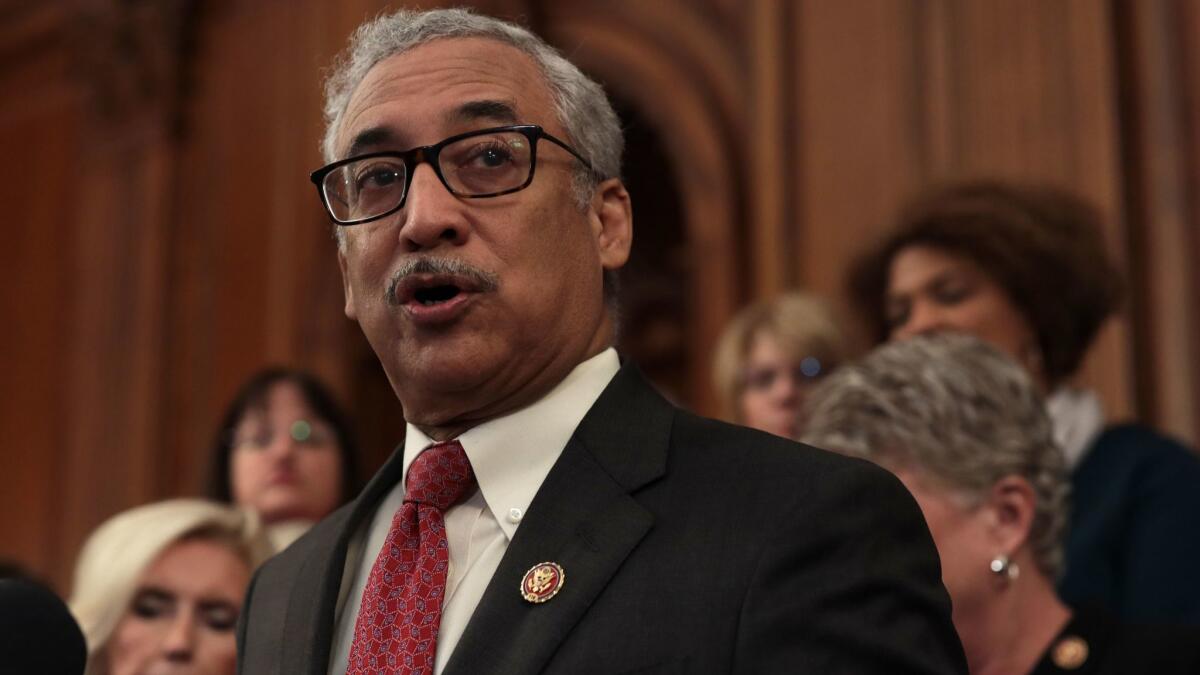NLRB shouldn’t have subcontractors work on rule about subcontractors, Democrats say

- Share via
Under President Trump, the National Labor Relations Board told its employees that tight budgets will require cuts to compensation and even downsizing, an agency union said. So it came as a surprise when the union learned the board wants to pay subcontractors to do work that employees traditionally perform.
Congressional Democrats were surprised too — especially when they found out what the subcontractors would be doing.
In a Thursday letter to NLRB Chairman John Ring, a management-side attorney appointed by Trump, House Democrats said they are “extremely concerned about reports” that the agency is planning to contract with a third party to review public comments on its proposed new “joint employer” rule. The rule would govern subcontractors’ business relationships and liability.
The proposed rule would alter the national standard by which corporations can be held liable for the mistreatment of workers paid by its subcontractors or franchisees. It would also change the standard by which those corporations can be forced to collectively bargain with those workers. In both cases, the new rule would significantly shift the standard in favor of corporations.
“All we have heard from our leadership for more than a year is that because of a budget crisis they have to cut employee compensation and downsize the agency,” said Karen Cook, president of the NLRB Professional Assn. “So it was particularly galling to find out that Chairman Ring is making plans to spend the agency’s limited funds to hire contractors.”
The Democratic lawmakers — Rep. Bobby Scott of Virginia, chairman of the Committee on Education and Labor, and Rep. Frederica Wilson of Florida, who chairs its subcommittee on Health, Employment, Labor and Pensions — wrote that contracting out the work of reviewing comments “appears to be an alarming course of action.” They said the agency “risks further fueling public concerns that it is tainting the rulemaking with conflicts of interest,” especially if the comment-review work goes to a law firm or other company that has consulted or represented any organizations or associations that have submitted comments about the rule.
The agency “already has the most qualified staff” for the task on its own payroll, the Democrats said in their letter.
The NLRB didn’t immediately respond to a request for comment.
Under President Obama, the NLRB (then with a majority of Democratic appointees) made it harder for companies to avoid being considered “joint employers” when it came to alleged wrongdoing by subcontractors or franchises. Undoing that precedent has been a priority for business lobbyists since Trump took office.
But their efforts to make it happen have hit some snags. The board, now with a Republican majority, issued a ruling in a December 2017 case that would have overturned the earlier precedent. But the decision was set aside after the agency’s inspector general said one of the Trump appointees, another management-side attorney, should have recused himself due to a conflict of interest.
Last summer, the NLRB signaled it would move forward with rule-making rather than finding another case to remake the existing employee-friendly standard. The strategy sparked furious lobbying from advocates on both sides as well as tens of thousands of public comments, which the agency is legally required to review.
In their letter, the Democratic lawmakers request that Ring provide documents regarding the potential outsourcing, including any draft contracts or solicitations for the work, plans to avoid conflicts of interest, and legal analysis about how it would adhere to rules restricting who can perform “inherently governmental” functions.
The prospect of subcontracting is the latest flashpoint in months of tension over joint-employer liability between the NLRB and congressional Democrats. In a letter to Ring last May, Sens. Kirsten Gillibrand (D-N.Y.), Elizabeth Warren (D-Mass.) and Bernie Sanders (I-Vt.) — now all presidential candidates — cast the rule-making effort as an inappropriate effort to evade the ethics regulations that derailed its last attempt to end the Obama-era rule.
In January, Democrats including Scott wrote a letter urging Ring to abandon the effort after a federal court upheld core aspects of the existing standard; the lawmakers argued that the court’s decision foreclosed the NLRB’s attempts to undercut that standard. In response, Ring wrote that abandoning the proposed rule-making “would be unfair to the thousands of individuals and groups that have expressed such a strong desire to be heard on this important topic.”
More to Read
Inside the business of entertainment
The Wide Shot brings you news, analysis and insights on everything from streaming wars to production — and what it all means for the future.
You may occasionally receive promotional content from the Los Angeles Times.










